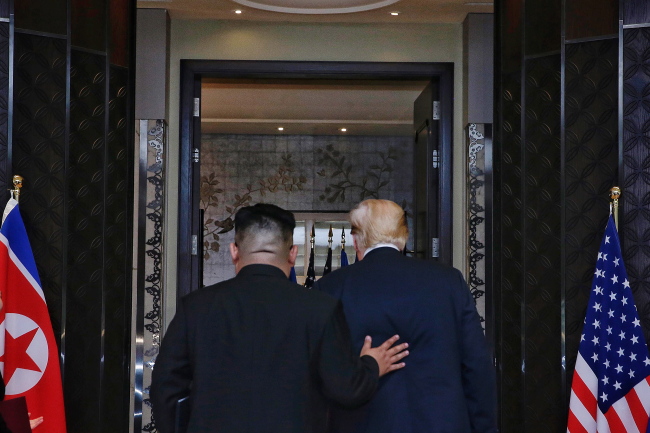The governments of the US and the two Koreas are hailing Tuesday’s US-North Korea agreement as a historic step, but experts are divided on the issue.
The agreement signed by US President Donald Trump and North Korean leader Kim Jong-un states that the two countries will work together for denuclearization, and the US will provide security guarantees for the North.
The agreement signed by US President Donald Trump and North Korean leader Kim Jong-un states that the two countries will work together for denuclearization, and the US will provide security guarantees for the North.

The agreement also states that remains of US troops from the Korean War will be returned, and the two sides will cooperate for lasting and stable peace on the peninsula.
South Korean scholars favorable toward the Moon Jae-in administration say that the agreement is a major milestone in inter-Korean, and US-North Korea relations.
“The Moon Jae-in process was transformed into the Moon Jae-in-Kim Jong-un process through the April 27 (inter-Korean) summit. And yesterday, it became the Moon Jae-in-Kim Jong-un-Trump process that completes the big picture in the denuclearization process,” professor Koh Yu-hwan of Dongguk University said at a forum organized by the Korea Press Foundation in Singapore. Koh is also a member of the Presidential Commission on Policy Planning.
“The summit’s significance lies in ending the hostile relationship that has lasted some 70 years, and setting a new relationship.
Highlighting that the security and political environment of South Korea is closely tied to US-North Korea hostilities, Koh went on to say that a change in US-North Korea relations would lead to that structure being overhauled.
“The core is a new North Korea-US relations being established, it means a change in the paradigm.”
He added that although there was no mention of a timetable for North Korea’s denuclearization, Kim Jong-un has nothing to gain by slowing the process.
“As the sanctions and pressure will remain (until denuclearization goals are obtained) Kim Jong-un has no reason to slow the process.”
Kim Joon-hyung of Handong University, another pro-Moon scholar, played down the omission of the expression CVID -- complete, verifiable and irreversible denuclearization -- from the agreement.
Comparing CVID to religious fundamentalism, Kim said that it is an unobtainable goal, claiming that should North Korea choose to hide its nuclear weapons program, there is no real way to determine that it has been completely dismantled.
“(What is needed) is realistic CVID, and for this the ‘I’ and the ‘V’ is not possible. The ‘D’ equates to our, and the US’ trust,” Kim said, stressing that trust among the concerned parties is the most important element.
He added that the actions of Kim and Trump appear to be in line with the idea of “trust first, then test,” and such an approach is the most suitable for changing the paradigm of the Korean Peninsula’s situation.
Others say that while it is too early to tell, the US-North Korea agreement could signal the wrong first step toward denuclearization.
“CVID was not included (in the agreement) and according to Rodong Shinmun reports, (the US and North Korea) agreed to follow phased and simultaneous plans,” said Kim Hyun-wook, a professor at the National Korea Diplomatic Academy. He said that while the matter depends on working-level talks between the two countries, Tuesday’s agreement was clearly “the first button being done up wrong.”
“Compared to the earlier position of denuclearization first, rewards later, it can be seen as (the process) being skewed toward North Korea’s position.”
Although the US-North Korea summit and the two leaders signing a joint statement were unprecedented events, Trump’s post-summit press conference made a bigger impact on South Koreans.
At the press conference, Trump revealed that US-South Korea joint military drills will be halted as long as negotiations move along in the right direction. The US president also revealed that Pyongyang was in the process of shutting down a major missile engine testing facility.
“(The halting of joint drills) is likely to be what is given by the US in return for North Korea shutting down the nuclear and missile test sites,” Koh said, adding that he considers the shutdown of the missile engine facility and the Punggye-ri nuclear testing site to be a “package” in return for which North Korea gained the cessation of South Korea-US drills.
By Choi He-suk (cheesuk@heraldcorp.com)








![[Kim Seong-kon] Democracy and the future of South Korea](http://res.heraldm.com/phpwas/restmb_idxmake.php?idx=644&simg=/content/image/2024/04/16/20240416050802_0.jpg&u=)








![[KH Explains] Hyundai's full hybrid edge to pay off amid slow transition to pure EVs](http://res.heraldm.com/phpwas/restmb_idxmake.php?idx=652&simg=/content/image/2024/04/18/20240418050645_0.jpg&u=20240418181020)

![[Today’s K-pop] Zico drops snippet of collaboration with Jennie](http://res.heraldm.com/phpwas/restmb_idxmake.php?idx=642&simg=/content/image/2024/04/18/20240418050702_0.jpg&u=)